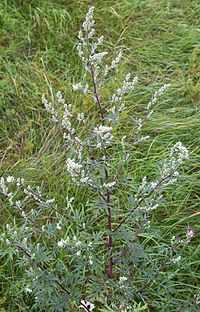
Photo from wikipedia
BACKGROUND Artemisia selengensis Turcz (AST) is a common edible and medicinal herb possessing extensive biological activities and various health-promoting functions. However, the anti-aging effects of AST have been neglected. This… Click to show full abstract
BACKGROUND Artemisia selengensis Turcz (AST) is a common edible and medicinal herb possessing extensive biological activities and various health-promoting functions. However, the anti-aging effects of AST have been neglected. This work evaluated the effects of Artemisia selengensis Turcz leaves extract (ASTE) on stress tolerance and longevity in Caenorhabditis elegans (C. elegans). RESULTS ASTE treatment enhanced stress resistance and significantly extended the lifespan of C. elegans. Moreover, ASTE prolonged the healthspan by increasing the body bending and pharyngeal pumping rates and reducing the intestinal lipofuscin level and intracellular reactive oxygen species (ROS) accumulation. Caffeoylquinic acids in ASTE, especially dicaffeoylquinic acids, were the major components responsible for these benefits. The mechanism underlying the anti-aging effect of ASTE occurred by activating insulin/insulin-like growth factor, SIR-2.1 signaling and mitochondrial dysfunction pathways, which in turn induced the activity of the transcription factors DAF-16/FOXO and SKN-1/Nrf2. CONCLUSION These findings provide direct evidence for the anti-aging effects of AST and reveal its potential on promoting healthy aging. This article is protected by copyright. All rights reserved.
Journal Title: Journal of the science of food and agriculture
Year Published: 2022
Link to full text (if available)
Share on Social Media: Sign Up to like & get
recommendations!